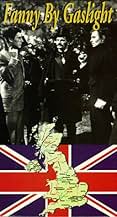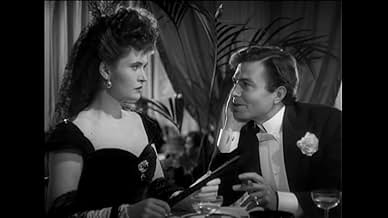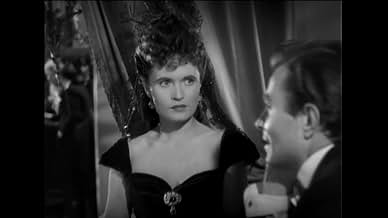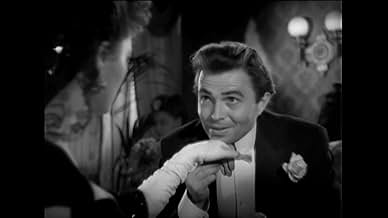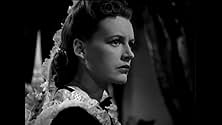Fanny's father dies in a fight. Her family runs a brothel. Her real father is a politician. She falls for his advisor Harry. Lord Manderstoke's interference causes conflicts between classes.... Read allFanny's father dies in a fight. Her family runs a brothel. Her real father is a politician. She falls for his advisor Harry. Lord Manderstoke's interference causes conflicts between classes. Tragic events occur due to the Lord's schemes.Fanny's father dies in a fight. Her family runs a brothel. Her real father is a politician. She falls for his advisor Harry. Lord Manderstoke's interference causes conflicts between classes. Tragic events occur due to the Lord's schemes.
- Director
- Writers
- Stars
- Maid
- (uncredited)
- Director
- Writers
- All cast & crew
- Production, box office & more at IMDbPro
Featured reviews
'Fanny By Gaslight' does try - it manages to get subject matter into it that must have seemed very daring in the 1940s, it starts well and grows into some good scenes between Fanny ('only Hooper') and her employer's wife. Then - perhaps because of Granger, IMO - it starts to backfire badly and become a bore. A great disappointment.
Adapted from a hit novel of the day, its story, set in late 19th century London revolves around young Fanny, Phyllis Calvert, in another of her do-gooder period-roles, who we first see as a child and who it's fair to say, enjoys an unconventional childhood. Not only do her parents unbeknownst to her run a brothel for high-society gents, but she loses both her father and mother in a short period of time, the former at the hands of James Mason's truculent Lord Manderstroke. Years later, now a young adult, she learns her true parentage and is reunited happily with the prosperous Cabinet minister who obviously had a fling with her mother and fathered her, only for her jealous stepmother to force him to self-destruction under threat of exposing his illegitimate daughter to the public gaze.
Fanny's eventful young life surely is one of snakes and ladders on a grand scale and this really is that big one on the board at square 99 taking you all the way back down again as she is turned out onto the street and struggles to find any kind of work, before ending up helping out at a low-end public house run by her old, now retired family manservant who goes by the wonderful name of Chunks. However, there is a ladder ahead for our Fanny in the form of her real dad's dashing and handsome private male secretary, played with brio by Stewart Granger, himself destined for high office, who she first met and innocently beguiled at her father's estate. Despite the opposition of his super-snobbish mother and sister about her low and scandalous beginnings, he pursues her ardently as a happy ending again comes into view for her. That is, until they encounter in Paris the dastardly Manderstroke again...
One can easily imagine the page-turning potboiler on which it was based and director Anthony Asquith pretty much applies the same technique on the screen. There's even some social commentary on class differences with Granger's Harry Somersford even predicting that one day there will be no class system years from now, but don't go thinking that this feature is some extended Marxist tract, it's just an unpretentiously entertaining rags-to-riches-to-rags-to-riches story of Fanny down our alley.
I enjoyed Calvert's bright-eyed performance as the plucky title-character and Granger and Mason too in their already typecast roles as handsome gallant and pantomime villain respectively. Like I said, the film packs a lot into its 102 minutes and while you'd never mistake it for "War and Peace" , I found it to be a pleasant, undemanding piece of escapism, aimed very much at its captive working-class audience of the day.
In many ways, FANNY comes straight out of Victorian melodrama. The hypocrisy of Victorian England as essayed in Dickens and Conan Doyle is rife here: the delicate pattern of respectability is shown to be infinitely fragile. This is why the accumulation of Fanny's traumas is so plausible - one toppling domino of the edifice of respectability leads to a complete and far-reaching collapse.
The result is a failure of patriarchy, an oppression split against itself. Look at the frightening scene where Fanny's 'real' father is shown in splintered mirror reflection - the pressure turns him, Jekyll-and-Hyde-like, from a feckless, passive fraud, into a figure from a horror film, as he foresees his own death, the only option to his self-created web of deceit (wow, you really do get into it!). Fanny's first family home stands over her supposed father's burlesque house, home to many of the Victorian great and good. The fact that she has two fathers emphasises this pervasive dichotomy.
Women, in this double world, have only two options open to them, and they have a rotten deal in both. If they try to live with integrity and decency, like Fanny, they are buffeted, nay fairly walloped by a most malevolent Fate (or the workings of a corrupt social machination, whatever you want to call it). Fanny's swoonings are less conventional Victoriana than blows dealt by forces beyond her.
If, on the other hand, women transgress, like Lucy, or her father's wife (both, appropriately, if cheerfully xenophobically, linked to Frenchness), they are equally vulnerable to caprice, as their lovers turn against them, or abandon them. The film is also very good on how the idea of 'woman' is constructed in patriarchal society - there are many elaborate scenes of dressing and undressing, distortions of 'natural' femininity. Class construction is analysed too, also limiting and defeating men.
The title of the film might seem oblique, or merely atmospheric, until we note all the gaslamps standing suggestively between characters; part of a wider phallic plot, seen most interestingly, less obviously, between Stewart Granger and James Mason. Mason is perversely the most sympathetic character in the film. I say perversely, because, for the first hour and a half, he is a real monster, a glorious, diabolical, handsome, unredeemably vicious, incredibly sexy monster, who clearly has the filthiest, and most elaborate, Sadean sex ever. He is the ultimate transgressor, taboo in both the Underworld and respectable society, the two being complicit in the same corrupting system. He is only on screen in annoyingly , if appropriately brief, spurts - the first fifteen minutes of the film is electrifying entertainment. He is an aristocrat, locus of all the fears, yet desires (and 1940s British women worshipped him) of the British middle classes.
But when he goes to France - as all four protagonists do: it is a site of freedom from the ubiquitous repression of Britain, but also the ultimate venue of closure where everything is fatally brought to a head - he becomes a much more understandable, tragic figure. We see he has been demonised by respectable society as a demonic Id that must be cast out. His reduction from malevolent swaggerer to simian depressive is a shock to behold. His forcing of the duel is less a matter of honour than a poignant wishing for death. Mason is outstanding, turning a potential caricature into a figure of far greater depth. He is the Fassbinder hero of this melodrama, the tormented transgressor; not the two protagonists, whose desire for conventionality will only replicate the system that tortured them in the first place.
What is finally remarkable about the film is how these issues managed to get aired at the height of World War II. Gainsborough films were by far the most popular among British audiences at a time when duty, austerity, self-denial was mandatory. These films, and especially FANNY, by contrast, became the focus of all those repressed desires - a dissatiafaciton with authority and patriarchy; the thrill of (particularly female) transgression; the impulse to excess; a rejection of duty and tradition; all the things in real life audience members were supposed to be defending. Is it any surprise Labour got in the following year? That is why the films, beyond their stereotypical melodrama, remain enduringly fascinating. Just more James Mason, please...mmm.
Of course it is Phyllis Calvert as Fanny who dominates the film, ably supported by a well-chosen supporting cast. I much regret that my favorite contemporary British director, Ken Russell, was never able to realize his last major project -a new version of "Moll Flanders", but seeing this 1944 costume picture some 80 years after courtesy of YouTube makes up for it thanks to a very fine British print.
Did you know
- TriviaThe film was originally banned in the USA because it transgressed the Hays Purity Code.
- Quotes
Clive Seymour: Fanny. I don't know how to begin to tell you this. I promised your mother. William Hopwood was not your father.
- Crazy creditsOpening credits prologue: LONDON
1870
- ConnectionsFeatured in The Ultimate Film (2004)
- How long is Man of Evil?Powered by Alexa
Details
- Runtime1 hour 30 minutes
- Color
- Aspect ratio
- 1.33 : 1
Contribute to this page


